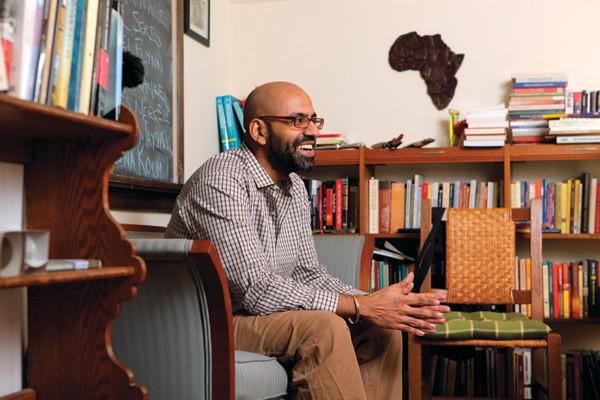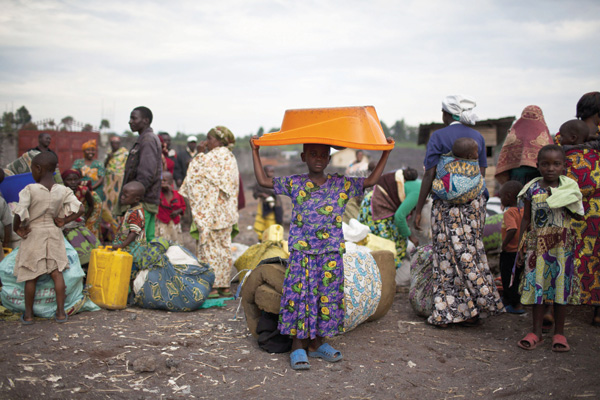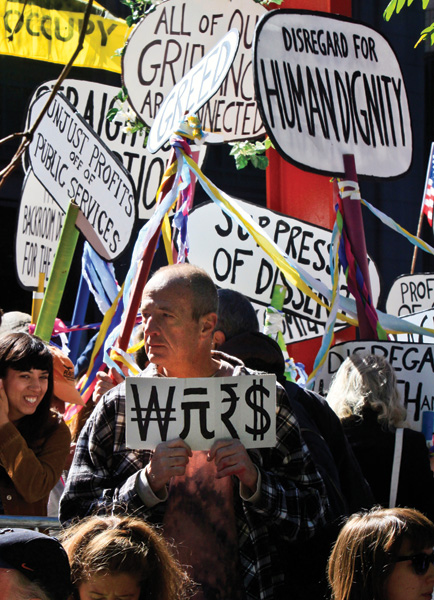Reexamining Rebellion
The academic life is one of quiet contemplation and leisurely conversation, of long, pleasant hours spent doing research in the splendid surroundings of wonderful libraries. So goes the stereotype.

We certainly do not think of an academic career as involving extended forays into territories ruled by armed rebels in the middle of civil wars. Yet that is precisely where Zachariah Cherian Mampilly could be found doing much of the research for his book, Rebel Rulers: Insurgent Governance and Civilian Life during War, published by the Cornell University Press in 2011. Reflecting on the dangers apparent in such locales, Mampilly notes the importance of cultivating “knowledgeable networks on the ground” that can help you “avoid the pitfalls while pointing you towards what’s important.” And he observes that a healthy dose of good luck and an American passport may also help.
Mampilly was already well into the study of insurgent governance when he joined the Vassar political science department in 2007. At Vassar, he quickly established a strong reputation as a teacher and scholar, and was recently promoted to a tenured position as an associate professor of political science, international studies, and Africana studies.
He completed his undergraduate work at Tufts and his graduate work at Columbia and UCLA. He took leave from Tufts to spend his junior year as a visiting student at the University of Dar es Salaam in Tanzania and later returned as a visiting faculty member. The university was an intellectual home for legions of African leaders and a breeding ground for generations of African revolutionaries as wide swaths of Africa moved into the postcolonial era. As a student, Mampilly enrolled in a yearlong seminar with Ernest Wamba dia Wamba, a leading African political theorist then in exile from his native Congo. In the course of the year, he developed a close relationship with Wamba dia Wamba and his family and absorbed many of his lessons about the political challenges confronting poor, oppressed, and marginalized people not only in Africa but throughout the Afro-Asian world and beyond.
Not long after Mampilly resumed his work at Tufts, Wamba dia Wamba left Tanzania to return to the Congo, this time as a top official in the rebel movement challenging the existing government. The Congolese insurgency became one of the most violent and brutal in recent African history. To Mampilly that seemed sharply at odds with the ideological commitment to improve the conditions of civilian life so persuasively and sincerely articulated by Wamba dia Wamba in class and in conversation. Puzzling about the contrast led Mampilly to research his first book, an examination of the varied ways rebel movements relate to the civilians they encounter during their frequently violent conflicts with regimes in power.

The book combines sophisticated theoretical analysis of the roots of rebel movements with observations made during extensive field work in disparate and often dangerous settings. With family roots in South India, Mampilly describes himself as an “Africanist by training and South Asian by heritage.” His field work has taken him into insurgent territory on both continents, in the Congo, Sudan, and Sri Lanka, bridging the boundaries academics have traditionally used to divide the world.
For analysts, rebellion normally means violence and chaos. In Mampilly’s words, armed groups have been “treated largely through the lens of pure destruction and wanton violence and terrorism.” But rebel movements often control and govern large tracts of territory for extended periods of time. Mampilly examines how and how well they meet the test of governance. He tries “to understand some of their nonviolent aspects, to really look at how well they succeed at actually doing the things that they suggest that they are fighting for in the first place, namely to improve the conditions of civilians who live in these areas.” He explores the performance of traditional functions of government under circumstances of civil war. Who dispenses justice? Who builds and maintains roads and bridges? Who runs the schools? Focusing on these tasks provides a “rare and nuanced look into the politics of ‘nonstates’,” in the words of reviewer and Pomona College professor of African politics Pierre Englebert.
Mampilly situates his work on rebel governance within a broader concern for “the idea of resistance and what that looks like in different contexts, different spaces, different times, different manifestations, whether violent or nonviolent.” He challenges tendencies either “to romanticize the actions of those who are engaged in these types of resistance projects or to demonize them.” In a forthcoming book on political protest in Africa, he intends to focus “a lot more on the question of nonviolent resistance or rather resistance that is not organized by an armed group as, of course, there are many violent aspects to nonviolent resistance as well.”
Western models of political protest are linked to organized actions usually structured by established political organizations pursuing reasonably well-defined objectives. By contrast, political protest in Africa and sometimes in Asia is usually pictured as rather inchoate, lacking in focus and organization, missing clearly defined goals and objectives—as unrest more than protest. Mampilly argues that neither of these formulations provides an accurate picture of political protest in either Africa or the West. Moreover, he believes that even when protest seems to fail, when it seems to fade away or is suppressed, it may actually achieve substantial success by changing political discourse, by creating a climate for subsequent political action or reform. In this sense he views political protest less as episodic, more as part of a sustained pattern of political activity. The recent Occupy movement in the U.S. is a case in point, and Mampilly, who maintains his home in the Bronx, observes that it provided a good deal of the thematic background for Bill de Blasio’s hugely successful mayoral campaign in New York City.

In the classroom, Mampilly has found groups of students and colleagues responsive to the breadth of his disciplinary concerns and area interests, a testimony not only to his teaching skill but also to some of the changes at Vassar over the years. When this reporter joined the faculty in 1964, the curriculum in the humanities and social sciences was structured almost exclusively by academic discipline and remained highly Eurocentric. No courses focused on Africa, very few touched on Asia or Latin America. There were no multidisciplinary programs—only a handful of special courses tackled issues from the perspective of multiple disciplines. By the time Mampilly joined the faculty in 2007, Africa and the African Diaspora had become the focus of teaching and research for a remarkably talented group of faculty with strong training and teaching commitments in almost all of the social science and humanities disciplines. Thriving programs in Africana studies, Asian studies, Latin American studies, and international studies offered students special opportunities alongside a wide variety of other multidisciplinary programs spanning the humanities, the social sciences, and many other sciences as well.
Mampilly found intellectual excitement working with the students and colleagues in several of these programs. His own work cut across the disciplinary boundaries of political science, history, anthropology, and Asian and African studies, among others. In introductory courses in the international studies program as well as advanced courses dealing with contemporary civil wars, he challenged students to think about global issues in new ways. Taking transnationalism seriously as a starting point, Mampilly emphasized the nation-state paradigm as the main source of the national and individual identities that shape our understanding of the modern world but went on to “show how these categories are inadequate,” how they obscure the “emergence of even smaller identity movements that try to conceptualize themselves into alternate political arrangements,” as the Tamils in Sri Lanka have done.
Questioning the intellectual and political dominance of the nation-state paradigm can be unsettling for students. “It undercuts everything they’ve learned about their identities, origin of nationalism and nationality, the core of who they are as individuals.” So, he says, he asks his students, including those from the U.S., “Do you consider yourselves postcolonial? And many times they struggle with the meaning of that identity because they don’t feel that that’s a category that applies to them. But all I’m saying is it’s historical fact.”
Well into an ambitious research agenda and deeply committed to the intellectual and personal development of his students, Mampilly has now taken on additional responsibilities as director of the Africana Studies program, and is helping to revise the curriculum and plan a yearlong series of campus and community events to examine the legacies of the Civil Rights Act and the Voting Rights Act, 50 years on.
“So,” he says, “I feel like I already have a plan for how my next three years will be spent.” His students and colleagues can be happy that those years will be spent further enriching the intellectual climate at Vassar and beyond.
Glen Johnson is professor emeritus at Vassar, where he taught as the Shirley Eckert Boskey Professor of Political Science and International Relations and twice served as acting president of the college. He was a distinguished visiting professor at the American University in Cairo and twice a Fulbright scholar in India.
